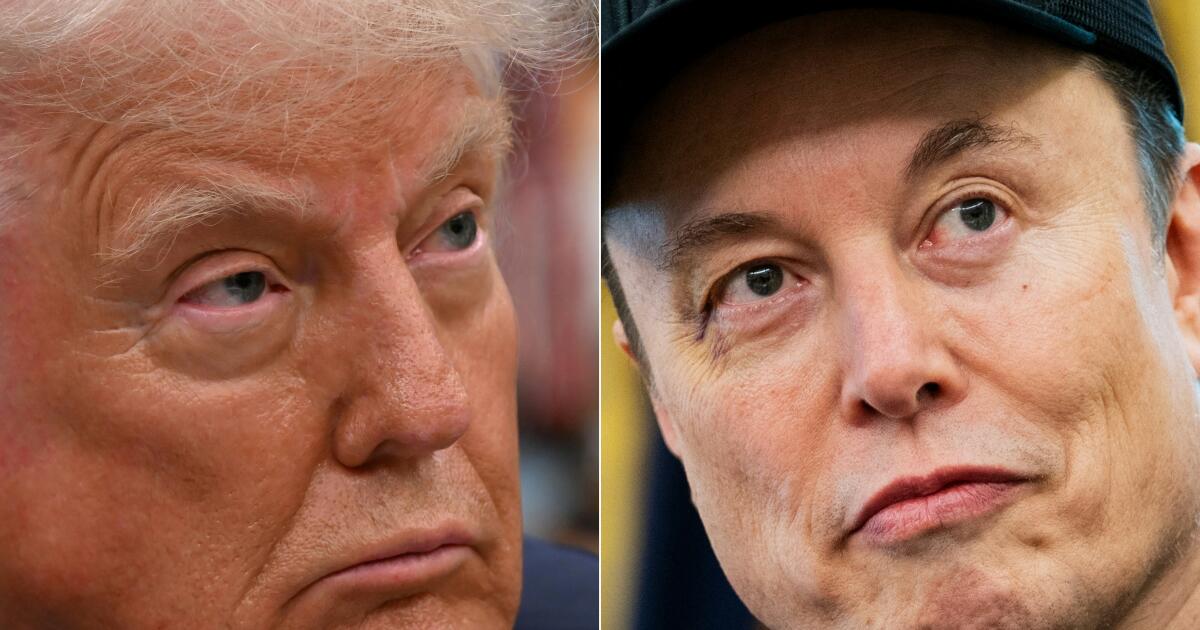Trump foes find themselves targeted by top housing regulator
WASHINGTON — When Bill Pulte was nominated as the country’s top housing regulator, he told senators that his “number one mission will be to strengthen and safeguard the housing finance system.”
But since he started the job, he’s distinguished himself by targeting President Trump ‘s political enemies. He’s using property records to make accusations of mortgage fraud and encourage criminal investigations, wielding an obscure position to serve as a presidential enforcer.
This week, Trump used allegations publicized by Pulte in an attempt to fire Lisa Cook, a member of the Federal Reserve board, as he tries to exert more control over the traditionally independent central bank.
Pulte claims that Cook designated two homes as her primary residence to get more favorable mortgage rates. Cook plans to fight her removal, laying the groundwork for a legal battle that could reshape a cornerstone institution in the American economy.
Trump said Tuesday that Cook “seems to have had an infraction, and you can’t have an infraction,” adding that he has “some very good people” in mind to replace her.
Pulte has cheered on the president’s campaign with a Trumpian flourish.
“Fraud will not be tolerated in President Trump’s housing market,” he wrote on social media. “Thank you for your attention to this matter.”
Pulte targets Democrats but not Republicans
Pulte, 37, is a housing industry scion whose official job is director of the Federal Housing Finance Agency. He oversees mortgage buyers Fannie Mae and Freddie Mac, which were placed in conservatorship during the Great Recession almost two decades ago.
Like other political appointees, he routinely lavishes praise on his boss.
“President Trump is the greatest,” he posted over the weekend.
Pulte has made additional allegations of mortgage fraud against Sen. Adam Schiff, one of Trump’s top antagonists on Capitol Hill, and New York Attorney General Letitia James, who filed lawsuits against Trump. Those cases are being pursued by Ed Martin, a Justice Department official.
“In a world where housing is too expensive, we do not need to subsidize housing for fraudsters by letting them get better rates than they deserve,” Pulte wrote on social media.
Pulte has ignored a similar case involving Ken Paxton, the Texas attorney general who is friendly with Trump and is running for Senate in his state’s Republican primary. Paxton took out mortgages on three properties that were all identified as his primary residence.
He also has mortgages on two other properties that explicitly prohibit him from renting the properties out, but both have been repeatedly listed for rent, according to real estate listings and posts on short-term rental sites.
Asked about Pulte’s investigations and Trump’s role in them, the White House said that anyone who violates the law should be held accountable.
“President Trump’s only retribution is success and historic achievements for the American people,” said Davis Ingle, White House spokesman.
It’s unclear whether Pulte is using government resources to develop the allegations he has made. Mortgage documents are generally public records, but they are typically maintained at the county level across most of the U.S., making them difficult to comprehensively review. However, Fannie Mae and Freddie Mac, which are both government-sponsored entities, purchase large tranches of mortgages from lenders, which could centralize much of that information, real estate and legal experts say.
FHFA did not respond to a detailed list of questions from the AP, including whether Pulte or his aides used government resources to conduct his research.
It’s not just mortgages
Pulte’s broadsides go beyond mortgages. He’s been backing Trump’s criticism of Jerome Powell, chair of the Federal Reserve, over expensive renovations at the central bank’s headquarters. Trump is pressuring Powell to cut interest rates in hopes of lowering borrowing costs, and his allies have highlighted cost overruns to suggest that Powell is untrustworthy or should be removed from his position.
“This guy is supposed to be the money manager for the world’s biggest economy, and it doesn’t even look like he can run a construction site,” Pulte said while wearing a neon safety vest outside the building. “So something doesn’t smell right here.”
Since returning to the White House, Trump has reached deep into the government to advance his agenda. He’s overhauled the federal workforce with the Office of Personnel Management, pushed ideological changes at the Smithsonian network of museums and fired the commissioner of the Bureau of Labor Statistics when he didn’t like a recent report on job numbers.
With Pulte in charge, the Federal Housing Finance Agency is becoming another instrument of Trump’s mission to exert control and retaliate against enemies.
It’s a contrast to the Internal Revenue Service, where Trump has unsuccessfully discussed ways to use tax policies as a pressure point. For example, during battles over higher education, Trump threatened to take away Harvard’s long-standing tax-exempt status by saying, “It’s what they deserve.”
However, there are more restrictions there, dating back to the Watergate scandal under President Richard Nixon.
“It’s been hard for the administration to use the inroads it wants to use to pursue its enemies,” said Vanessa Williamson, a senior fellow at the Urban-Brookings Tax Policy Center.
She said, “The law is very clear about taxpayer privacy and the criminal penalties at play are not small.”
Before going on the attack, Pulte played nice online
Pulte is heir to a home-building fortune amassed by his grandfather, also named William Pulte, who founded a construction company in Detroit in the 1950s that grew into the publicly traded national housing giant now known as the Pulte Group.
He spent four years on the company’s board, and he’s the owner of heating and air conditioning businesses across the U.S. He had never served in government before being nominated by Trump to lead the Federal Housing Finance Agency.
“While many children spent their weekends at sporting events, I spent mine on homebuilding jobsites with my father and grandfather,” Pulte said in written testimony for his nomination hearing. “From the ground up, I learned every aspect of housing — whether it was cleaning job sites, assisting in construction, or helping sell homes.”
He once tried to make a name for himself with good deeds, describing himself as the “Inventor of Twitter Philanthropy” and offering money to needy people online. He was working in private equity at the time, and he told the Detroit Free Press that he funded his donations with some “very good liquidity events” to power his donations.
Even six years ago, he appeared focused on getting attention from Trump.
“If @realDonaldTrump retweets this, my team and I will give Two Beautiful Cars to Two Beautiful Veterans on Twitter.”
Trump replied, “Thank you, Bill, say hello to our GREAT VETERANS!”
Pulte, whose most recent financial disclosure shows a net worth of at least $180 million, was also ramping up his political donations.
Over the past six years, he and his wife have donated over $1 million to the political efforts of Trump and his allies, including a $500,000 contribution to a super PAC affiliated with Trump that was the subject of a campaign finance complaint made with the Federal Election Commission.
The Pultes’ $500,000 contribution was made through a company they control named ML Organization LLC, records show. While such contributions are typically allowed from corporations, the same is not always true for some limited liability companies that have a limited business footprint and could be set up to obscure the donor.
The FEC ultimately exonerated the Pultes, but found in April that the Trump super PAC, Make America Great Again, Again! Inc., did not properly disclose that the Pultes were the source of the donation, said Saurav Ghosh, the Campaign Legal Center’s director of federal campaign finance reform.
Ghosh said the donation raises serious questions about Pulte’s appointment to lead FHFA.
“Why is Bill Pulte even in a government position?” he said. “Maybe he’s qualified, maybe he isn’t. But he did pour hundreds of thousands of dollars into a pro-Trump super PAC. And I think it’s clear there are these types of rewards for big donors across the Trump administration.”
Megerian, Slodysko and Hussein write for the Associated Press.


